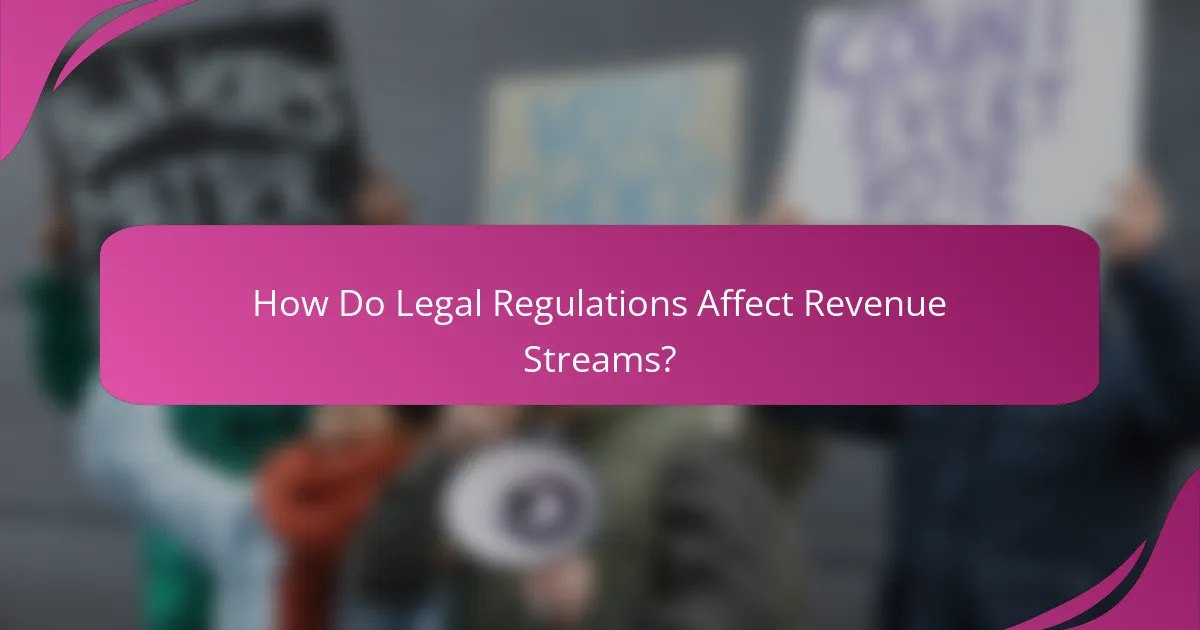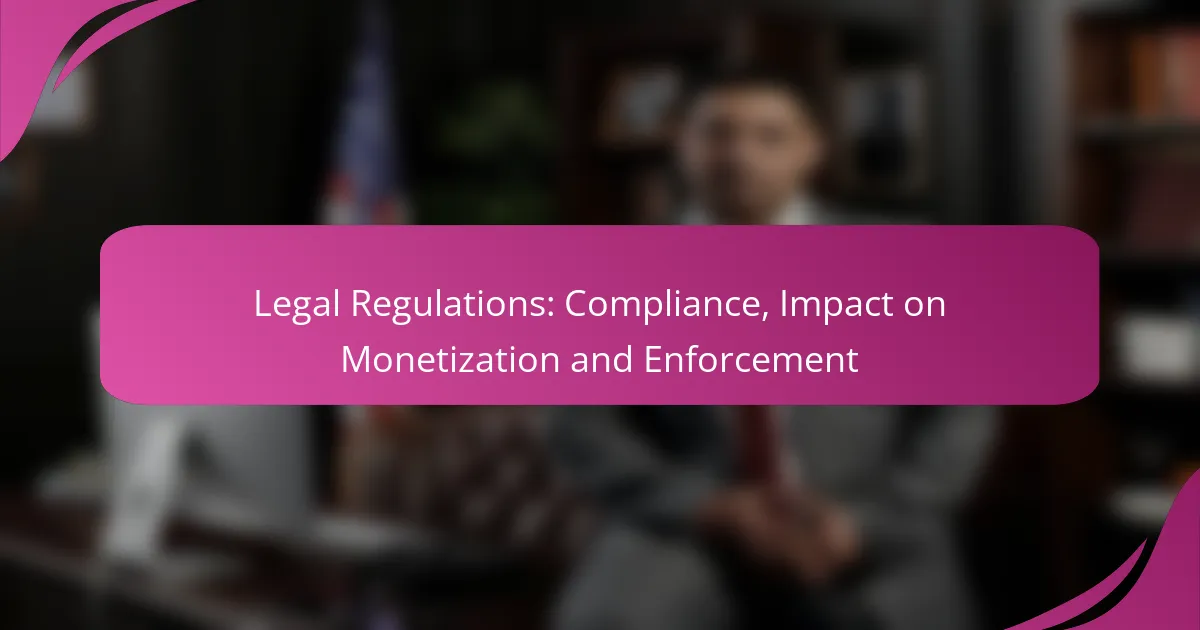Legal regulations play a crucial role in shaping how businesses monetize their services, with frameworks such as GDPR, CCPA, and HIPAA influencing data collection and usage practices. Compliance with these regulations not only incurs costs but also necessitates operational adjustments that can impact profitability. By adopting best practices for adherence, organizations can mitigate risks and enhance their integrity while navigating the complexities of legal requirements.

What Are the Key Legal Regulations Impacting Monetization?
Key legal regulations affecting monetization include GDPR, CCPA, HIPAA, FTC guidelines, and DMCA provisions. These regulations dictate how businesses can collect, use, and protect consumer data, directly influencing revenue models and compliance costs.
GDPR Compliance
The General Data Protection Regulation (GDPR) is a comprehensive data protection law in the European Union that impacts monetization strategies for businesses operating in or with EU citizens. Companies must obtain explicit consent from users before collecting personal data, and they must provide clear information on how this data will be used.
To comply, businesses should implement robust data management practices, including data minimization and the right to access and delete personal information. Non-compliance can lead to hefty fines, often reaching up to 4% of annual global revenue.
CCPA Requirements
The California Consumer Privacy Act (CCPA) grants California residents rights regarding their personal data, influencing how businesses monetize user information. Under CCPA, companies must disclose what personal data they collect and allow consumers to opt-out of data selling.
Businesses should update their privacy policies and provide clear options for users to manage their data preferences. Failing to comply can result in fines of up to $7,500 per violation, emphasizing the importance of adherence.
HIPAA Regulations
The Health Insurance Portability and Accountability Act (HIPAA) sets standards for the protection of health information in the United States. For businesses in the healthcare sector, compliance is crucial when monetizing health-related data.
Entities must ensure that any patient information shared for monetization purposes is de-identified or shared with proper consent. Violations can lead to significant penalties, making it essential to understand and implement HIPAA requirements effectively.
FTC Guidelines
The Federal Trade Commission (FTC) provides guidelines to protect consumers from deceptive practices in advertising and marketing. Businesses must ensure that their monetization strategies, particularly in digital advertising, are transparent and truthful.
To comply, companies should avoid misleading claims and ensure that endorsements are clearly disclosed. Regular audits of marketing practices can help mitigate risks associated with non-compliance.
DMCA Provisions
The Digital Millennium Copyright Act (DMCA) addresses copyright infringement in the digital space, impacting how businesses monetize online content. It provides a framework for copyright holders to protect their works and for platforms to respond to infringement claims.
Businesses should implement a DMCA takedown policy to address copyright issues proactively. Failure to comply can lead to liability for infringement, making it critical to understand and navigate DMCA provisions effectively.

How Do Legal Regulations Affect Revenue Streams?
Legal regulations significantly impact revenue streams by dictating how businesses can monetize their services. Compliance with these regulations can lead to increased costs and operational changes, which may affect overall profitability.
Impact on Advertising Revenue
Legal regulations can restrict the types of advertisements businesses can run, particularly in sensitive sectors like health and finance. For example, regulations may limit claims that can be made in ads, affecting how companies market their products.
Additionally, privacy laws such as GDPR in Europe require businesses to obtain explicit consent before collecting user data for targeted advertising. This can reduce the effectiveness of ad campaigns, leading to lower advertising revenue.
Influence on Subscription Models
Compliance with legal regulations can shape subscription models by necessitating clearer terms of service and user agreements. For instance, regulations may require businesses to provide detailed information about cancellation policies and data usage.
Moreover, subscription services must ensure that billing practices comply with consumer protection laws, which can impact pricing strategies and customer retention rates. Businesses should regularly review their compliance to avoid penalties that could disrupt revenue flow.
Effects on Affiliate Marketing
Legal regulations can influence affiliate marketing by imposing guidelines on disclosures and endorsements. Affiliates are often required to clearly disclose their relationships with brands, which can affect consumer trust and conversion rates.
Additionally, regulations regarding data privacy can limit how affiliates track and target potential customers. Companies should stay updated on relevant laws to ensure their affiliate programs remain compliant and effective, avoiding potential fines that could hinder revenue generation.

What Are the Best Practices for Compliance?
Best practices for compliance involve implementing systematic procedures to adhere to legal regulations, ensuring that organizations minimize risks and enhance their operational integrity. These practices typically include regular audits, robust data protection strategies, and comprehensive staff training programs.
Regular Audits
Conducting regular audits is essential for maintaining compliance with legal regulations. These audits help identify gaps in processes and ensure that all practices align with current laws and standards. Organizations should schedule audits at least annually, but more frequent checks may be necessary depending on the industry and regulatory environment.
During an audit, focus on key areas such as financial records, data handling practices, and operational procedures. Utilize both internal and external auditors to gain a comprehensive view of compliance status. Document findings and create action plans to address any identified issues promptly.
Data Protection Strategies
Implementing effective data protection strategies is crucial for compliance, especially with regulations like GDPR in Europe or CCPA in California. Organizations should assess their data handling practices, ensuring that personal information is collected, stored, and processed securely. This may involve encryption, access controls, and regular data backups.
Consider conducting a data protection impact assessment (DPIA) to evaluate risks and determine necessary safeguards. Regularly update your data protection policies to reflect changes in regulations and technology, and ensure that all systems are compliant with industry standards.
Staff Training Programs
Staff training programs are vital for fostering a culture of compliance within an organization. Training should cover regulatory requirements, data protection policies, and ethical practices. Regular workshops and online courses can help keep employees informed about their responsibilities and the importance of compliance.
Ensure that training is tailored to different roles within the organization, providing specific guidance relevant to each position. Evaluate the effectiveness of training programs through assessments and feedback, and update content regularly to reflect new regulations or changes in company policy.

How Is Compliance Enforced in the US?
Compliance in the US is enforced through a combination of regulatory agencies, legal frameworks, and penalties for violations. These mechanisms ensure that businesses adhere to laws and regulations, impacting their operations and monetization strategies.
Regulatory Bodies Involved
Several key regulatory bodies are responsible for enforcing compliance in the US, including the Federal Trade Commission (FTC), the Securities and Exchange Commission (SEC), and the Department of Justice (DOJ). Each agency has specific mandates, such as protecting consumer rights, overseeing financial markets, and enforcing antitrust laws.
Additionally, industry-specific regulators like the Food and Drug Administration (FDA) and the Environmental Protection Agency (EPA) play crucial roles in ensuring compliance within their sectors. Understanding which agency oversees your industry is essential for effective compliance management.
Penalties for Non-Compliance
Penalties for non-compliance can vary significantly based on the nature of the violation and the regulatory body involved. Common consequences include fines, which can range from hundreds to millions of dollars, depending on the severity of the offense.
In some cases, businesses may face additional repercussions such as legal action, loss of licenses, or restrictions on operations. It is vital for organizations to proactively address compliance issues to avoid these costly penalties.
Case Studies of Enforcement Actions
One notable case involved the FTC’s action against a major tech company for deceptive advertising practices, resulting in a settlement of over $5 million. This case highlighted the importance of transparency in marketing and the potential financial repercussions of misleading consumers.
Another example is the SEC’s enforcement against a financial firm for failing to disclose material information, leading to penalties exceeding $10 million. Such cases illustrate the critical need for businesses to maintain compliance with regulatory standards to protect their reputation and financial stability.

What Are the Emerging Trends in Legal Regulations?
Emerging trends in legal regulations focus on adapting to rapid technological advancements and addressing consumer protection. Key areas include data privacy, digital content monetization, and compliance with international standards.
Data Privacy Regulations
Data privacy regulations are increasingly stringent, reflecting growing concerns over personal information security. Laws like the General Data Protection Regulation (GDPR) in Europe and the California Consumer Privacy Act (CCPA) in the U.S. require businesses to implement robust data protection measures.
Companies must ensure they collect, store, and process user data transparently. Non-compliance can lead to hefty fines, often amounting to millions of dollars, making adherence essential for sustainable operations.
Digital Content Monetization
Legal frameworks around digital content monetization are evolving to protect creators and consumers alike. Regulations often focus on copyright issues, fair use, and the distribution of royalties, ensuring that creators receive fair compensation for their work.
Businesses should familiarize themselves with local copyright laws and consider implementing clear licensing agreements. This approach can mitigate legal risks and enhance revenue streams from digital content.
International Compliance Standards
As businesses expand globally, compliance with international regulations becomes critical. Standards such as the ISO 27001 for information security management and various anti-money laundering (AML) regulations are essential for companies operating across borders.
Organizations should conduct regular compliance audits and training sessions to stay updated on international laws. This proactive approach helps avoid legal pitfalls and fosters trust with international partners and customers.
